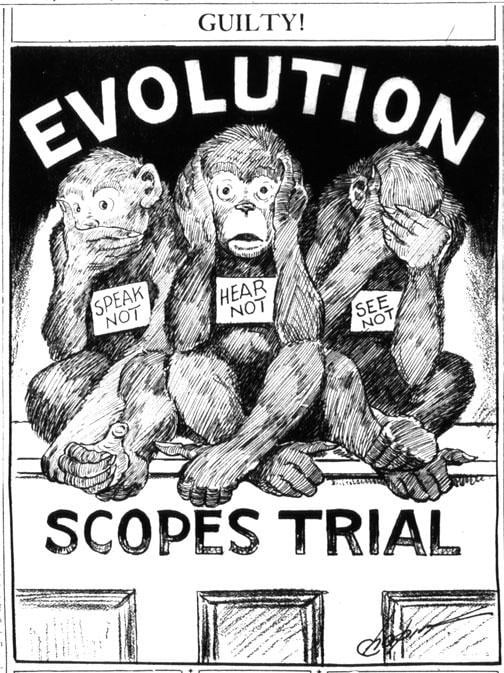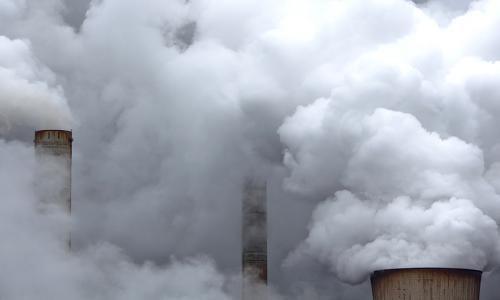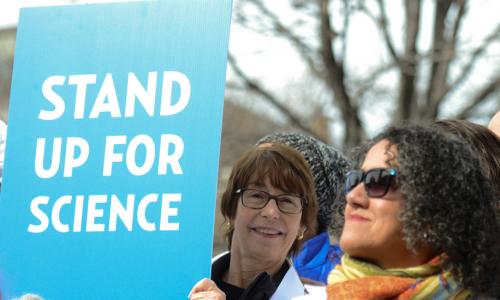Table of Contents
Major fossil fuel companies and special interest groups have worked for years to block efforts to reduce carbon pollution. They continue to do so today.
On February 9, 2016, the Supreme Court placed a hold on the Environmental Protection Agency’s (EPA’s) Clean Power Plan, the first-ever limits on heat-trapping carbon dioxide pollution from power plants. It’s the latest development in a disinformation campaign perpetrated by fossil fuel and utility interests to stop EPA action on climate change.
It's a story that goes back for years. In 1998, amidst Congressional gridlock on climate change, the EPA asserted its legal authority to regulate carbon pollution under existing provisions of the Clean Air Act. A memorandum from the EPA’s General Counsel affirmed that the agency had the authority to regulate carbon pollution, so long as it first found heat-trapping emissions that contribute to climate change could endanger public health and welfare or the environment. Nine years later, in 2007, the Supreme Court agreed.
In 2009, the EPA finalized its science-based endangerment finding for heat-trapping emissions, including carbon pollution. The EPA further acted in 2015, when it finalized the Clean Power Plan, the first-ever limits on carbon pollution from power plants.
Case studies in obstruction
Most Americans support EPA regulation of carbon pollution, including from power plants. Nonetheless, as evidenced below, fossil fuel and utility interests have stood in the way of EPA action on climate change at each step along the way, and these efforts continue today.
- Peabody Energy denies the scientific consensus on climate change in its attacks on the EPA.
- Southern Company secretly funded an outspoken climate skeptic, while seeking to roll back EPA limits on carbon pollution.
- American Coalition for Clean Coal Electricity has lobbied state attorneys general to oppose EPA limits on carbon pollution.
- American Legislative Exchange Council lobbies state legislators to oppose EPA regulation of carbon pollution on behalf of fossil fuel and utility interests.
- U.S. Chamber of Commerce opposes EPA’s science-based finding that heat-trapping emissions and climate change endanger public health, welfare, and the environment.
Now, however, these companies and industry trade groups are increasingly being held accountable for their years of deception and obstructionism. Growing public awareness and concern will further empower efforts to counter their undue influence, and open the door to further progress.
ExxonMobil
Evidence now strongly suggests that ExxonMobil, the world’s largest investor-owned producer of oil and natural gas, knew about the potential risks posed by climate change as far back as 1977. Nonetheless, ExxonMobil has spent millions of dollars to fund climate skeptic organizations that oppose the EPA's efforts to act on climate.
ExxonMobil now publicly admits that “the risks of climate change are real and warrant action.” And yet the company still opposes EPA action to limit carbon pollution from power plants. Rex Tillerson, CEO of ExxonMobil, disparaged the Clean Power Plan in a 2015 speech before the National Association of Manufacturers. Tillerson claimed to support “comprehensive and science-based cost-benefit analysis” of EPA regulations, but in reality ExxonMobil has funded special interest groups behind misleading reports that artificially inflate the costs and ignore the benefits of the Clean Power Plan. In 2014, ExxonMobil was also named in industry comments calling on the EPA to withdraw its Clean Power Plan proposal.
In 2009, prior to opposing the Clean Power Plan, ExxonMobil joined industry group comments that demanded the EPA withdraw its then-proposed endangerment finding for heat-trapping emissions, including carbon dioxide. The group’s comments falsely claimed scientific “support for the effects of climate change on public health and welfare is almost non-existent and engulfed in an extremely high degree of uncertainty.”
In 2008, a whistleblower identified lobbying by ExxonMobil as one reason why the administration of President George W. Bush stopped the EPA from going public with an earlier version of the endangerment finding.
ExxonMobil now faces multiple legal investigations for allegedly misleading investors and the public about the risks of climate change. Citizens and shareholders are voicing concerns about ExxonMobil’s ongoing funding of special interest groups, such as the American Legislative Exchange Council (ALEC) and the U.S. Chamber of Commerce, that seek to roll back the Clean Power Plan.
Peabody Energy
Peabody Energy, the world’s largest investor-owned coal company, has a long and ongoing record of deception on climate change that dates back to the early 1990s. It includes steadfast opposition to EPA regulation of heat-trapping carbon pollution.
Federal courts rejected several Peabody Energy-backed legal challenges aimed at blocking the Clean Power Plan, before the Supreme Court narrowly voted in early 2016 to place implementation of the EPA’s final rule on hold until remaining litigation is resolved.
Peabody Energy denied the clear scientific consensus on climate change in its 2014 comments on the the EPA’s Clean Power Plan proposal. The company’s comments claimed that “no science supports the relevant causal links – the connection between changes in GHG {greenhouse gas} levels and any changes in climate.” Peabody Energy also funded a misleading 2014 report by Energy Ventures Analysis, which artificially inflated the costs and ignored the benefits of the EPA’s proposal.
Before opposing the Clean Power Plan, Peabody Energy challenged the EPA’s 2009 endangerment finding for heat-trapping emissions. The company’s petition was one of several that, according to the EPA, wrongly “claimed that climate science can't be trusted, and asserted a conspiracy that calls into question the findings of the Intergovernmental Panel on Climate Change, the U.S. National Academy of Sciences, and the U.S. Global Change Research Program.” The EPA denied these petitions, having “found no evidence to support these claims.”
Earlier, in 2001, then President George W. Bush, under pressure from industry lobbyists, reneged on a campaign pledge to regulate carbon pollution in a letter to members of the US Senate.
“We applaud the announcement this week that the Administration did not support regulation of carbon dioxide as an air pollutant under the Clean Air Act; the position reflects one of our central guiding principals [sic],” wrote Irl Engelhardt, then CEO of Peabody Energy, in a private thank you note to Vice President Dick Cheney that was made public through a Freedom of Information Act request filed by the Natural Resources Defense Council.
A multi-year investigation by the attorney general for the State of New York resulted in a 2015 settlement that found Peabody Energy misled investors and the public about climate change-related financial risks. Peabody Energy has since declared bankruptcy, as the electricity market has shifted away from coal, the largest source of carbon pollution, and towards cleaner sources of electricity.
Southern Company
Southern Company, one of the nation’s largest electric utilities, has been at the forefront of disinformation campaigns targeting climate science and solutions since the early 1990s, and remains a staunch opponent of EPA action on climate change.
In 2016, the Supreme Court narrowly voted to place a hold on Clean Power Plan implementation, while the courts consider the merits of legal challenges backed by Southern Company. Internal emails made public by a 2014 New York Times investigation revealed that Southern Company lobbied state attorneys general to urge a federal court to “set aside” the Clean Power Plan proposal. That same year, Southern Company’s chief environmental officer called on the EPA to “withdraw its proposed rule.”
Southern Company secretly funded the outspoken climate skeptic Willie Soon until 2015, when a high profile investigation forced the utility company to finally sever its ties. Soon's employer, the Smithsonian Institute, also distanced itself from Soon’s controversial views, reiterated its own support for the established science on climate change, and launched an ethics review.
Earlier, in 2009, Southern Company endorsed the comments of the Utility Air Regulatory Group, which attacked the science underpinning the EPA’s endangerment finding for heat-trapping emissions.
In 2001, an influential lobbyist for Southern Company sent the administration of President George W. Bush a private memo, “Demurring on the issue of whether the CO2 idea is eco-extremism,” and opposing regulation of this heat-trapping emission as a pollutant. Bush, under pressure from industry lobbyists, reneged on a campaign pledge to regulate carbon pollution in a letter to members of the US Senate.
Peer-reviewed academic research has shown that Southern Company could face significant financial risks if the company is held legally liable for the climate change damages resulting from power plants’ carbon pollution.
American Coalition for Clean Coal Electricity
The American Coalition for Clean Coal Electricity (ACCCE) serves as a front group for coal and utility interests. It opposes climate action, including the EPA’s efforts to limit carbon pollution.
In 2016, the Supreme Court voted narrowly to place a hold on Clean Power Plan implementation, while the courts consider the merits of legal challenges backed by ACCCE.
Internal emails made public by a 2014 New York Times investigation revealed that ACCCE secretly lobbied state attorneys general to urge a federal court to “set aside” the EPA’s Clean Power Plan to limit carbon pollution from power plants. ACCCE also funded a series of misleading reports by NERA Economic Consulting, which sought to artificially inflate the costs and ignore the benefits of the Clean Power Plan.
Asked in 2009 if coal-fired plants, the nation’s largest single source of heat-trapping carbon pollution, contributed to climate change, a spokesperson for ACCCE refused to say. “I don’t know,” he told CNN. “I am not a scientist.”
That same year, ACCCE claimed to support Congressional action on climate change as an alternative to EPA regulation under the Clean Air Act. But, at the time, ACCCE was a subject of a congressional investigation into fraudulent letters that were sent to members of Congress by an associated public relations firm in an attempt to undermine climate change legislation.
In a leaked 2004 letter to the CEO of Peabody Energy, the Center for Energy and Economic Development, which later became the American Coalition for Clean Coal Electricity (ACCCE), took credit for several state attorneys general joining industry-backed opposition to EPA action on climate change in the federal courts.
Fossil fuel and utility industry support for ACCCE’s controversial attacks is on the wane, as evidenced by the group’s downsized budget and staff and ongoing corporate exodus. At least two dozen members have departed ACCCE since 2008, such as BHP Billiton, Consol Energy, Consumers Energy, Detroit Edison, Duke Energy, and First Energy. Companies that remain members include Southern Company and bankrupt coal companies, including Alpha Natural Resources and and Peabody Energy.
American Legislative Exchange Council (ALEC)
The American Legislative Exchange Council engages with state legislators in secretive meetings sponsored by fossil fuel and utility interests. ALEC is the source of many so-called “model policies” opposing EPA limits on carbon pollution and other clean energy policies.
“The biggest scam of the last 100 years is global warming,” one member of ALEC’s Private Enterprise Advisory Board said during the group’s 2015 annual meeting, at one of the few sessions open to reporters. ALEC’s Energy, Natural Resources, and Agriculture Task Force also approved new proposals that would hinder states’ ability to comply with the Clean Power Plan. One such ALEC proposal calls for state legislators to expedite use of state funds to back legal challenges to the Clean Power Plan. Sponsors of the annual meeting included the American Coalition for Clean Coal Electricity, Chevron, and ExxonMobil.
Leaked documents from ALEC’s 2014 annual meeting revealed another session where Joseph Bast, the president of the Heartland Institute, falsely claimed that “there is no scientific consensus on the human role in climate change.” That same year, ALEC approved a resolution that stated, “EPA should not pursue regulation of greenhouse gases,” and reportedly agreed to create a “working group” to explore abolishing the EPA as we know it. Internal documents obtained by The Guardian also exposed ALEC’s plan to recruit state attorneys general to oppose EPA action.
During the George W. Bush administration, ALEC joined the fossil fuel and utility industries’ early opposition to EPA action on climate change. In 2007, ALEC called on the EPA not to make an endangerment finding, and claimed there was a “lack of evidence that human-caused emissions of greenhouse gases will ‘endanger public health.” Several years earlier, in 2003, ALEC criticized efforts by state attorneys general to compel the EPA to act as “frivolous lawsuits… based on inconclusive science and faulty logic.” And in 2002, ALEC adopted a resolution that opposed any limits on heat-trapping carbon pollution.
The controversy over ALEC’s long and ongoing record of climate deception has helped to spark a mass exodus of more than 100 corporate funders from the group, including fossil fuel and utility companies American Electric Power, BP, and Shell. ExxonMobil and Peabody Energy remain leading members of ALEC’s Private Enterprise Advisory Council.

US Chamber of Commerce
The US Chamber of Commerce (US Chamber) claims to represent the interests of the business community, but few companies publicly agree with the group’s controversial positions on climate change. Opposing the EPA’s efforts to regulate heat-trapping emissions under the Clean Air Act, including the endangerment finding, remains a priority for the US Chamber.
The US Chamber is at the center of lawsuits aimed at blocking EPA action on climate change. Lawyers for the U.S. Chamber Litigation Center filed one of several requests for an immediate stay of the final Clean Power Plan, which the Supreme Court granted in 2016. In 2014, the U.S. Chamber joined ACCCE and Southern Company in soliciting state attorneys general to urge the D.C. Circuit Court to “set aside” the final version of this rule, several months before the EPA had put forth its initial proposal.
The US Chamber has also attempted to use deeply flawed and biased economic analysis that artificially inflates the perceived costs and ignores the benefits of the Clean Power Plan, but its misleading claims have been thoroughly dismantled by media fact checkers and clean energy experts.
A 2012 D.C. Circuit Court decision rejected earlier attempts by the US Chamber and others to roll back the EPA’s final endangerment finding for heat-trapping emissions. A few years before, in 2009, the U.S. Chamber called for a “Scopes Monkey Trial of the 21st Century” in response to the EPA’s then-proposed endangerment finding. “It would be evolution versus creationism,” US Chamber Vice President William Kovacs said at the time. “It will be climate change science on trial.”
Internal documents also show that Kovacs represented the U.S. Chamber at a 1999 meeting convened by the American Petroleum Institute, to coordinate the early industry response to calls for the EPA to act on climate change.
The US Chamber’s years of obstructionism on climate change have sparked considerable dissent among its corporate membership and local chambers. Major corporations—including several electric utilities—have quit the Chamber over its controversial positions. Current members of the US Chamber include ExxonMobil, Peabody Energy, and Southern Company.




